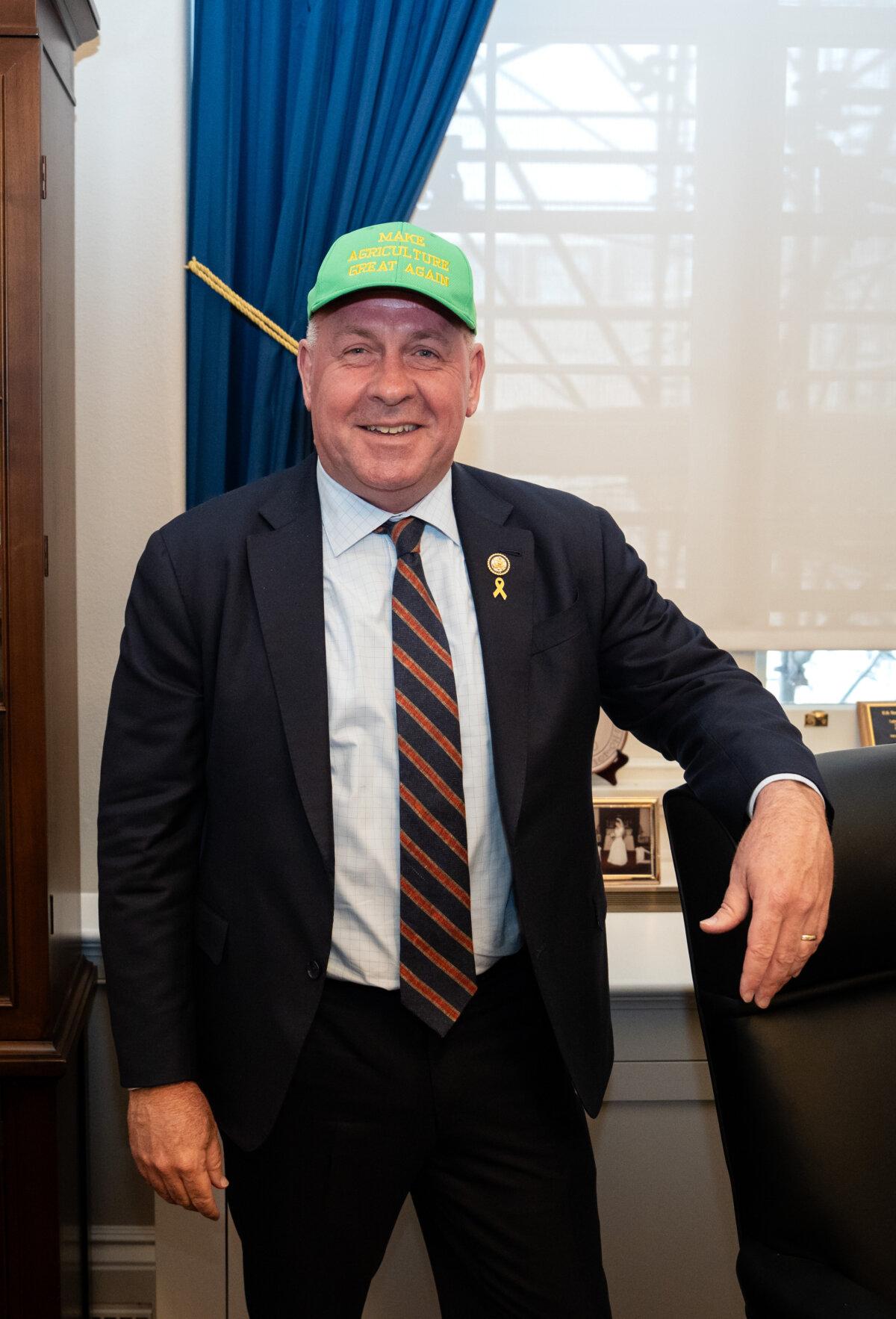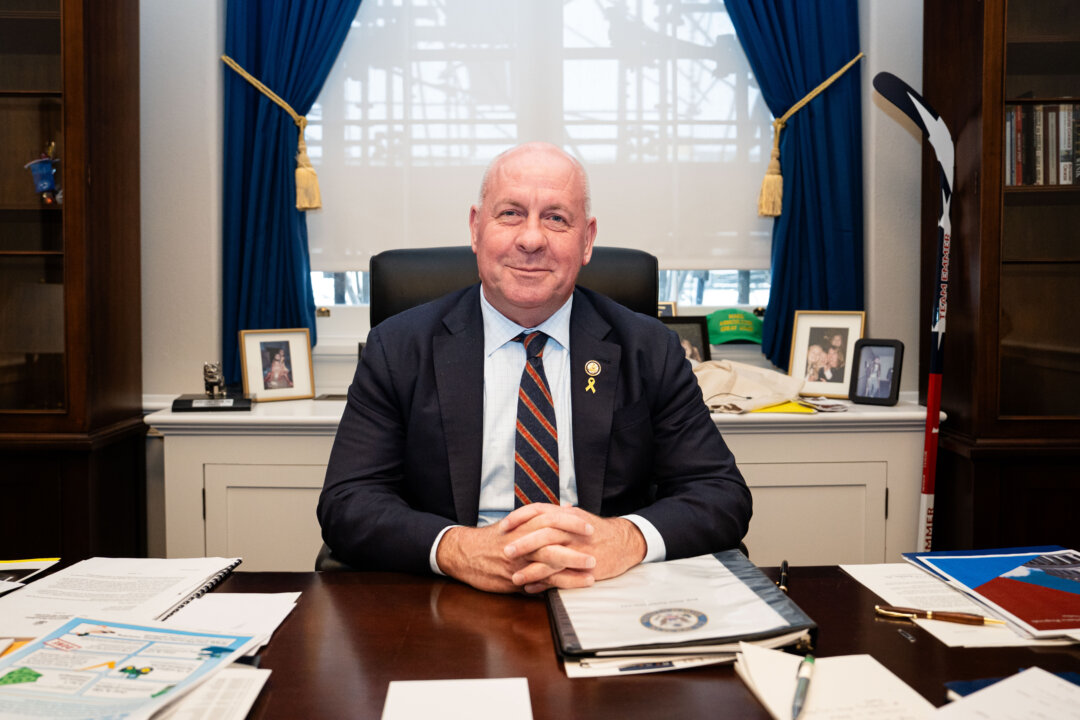Taylor wants to improve life for impoverished people who’ve watched another from their region become vice president.
WASHINGTON—Vice President JD Vance painted a vivid picture of Appalachia in his 2016 memoir “Hillbilly Elegy.” One of rural poverty mired in a substance-abuse epidemic, but also one centered on family and the resilience of the human spirit.
Now, freshman congressman, Rep. Dave Taylor (R-Ohio) aims to fix the region’s problems.
“You would be absolutely shocked if you rode around my district with me,” Taylor told The Epoch Times. “And it’s all the way people live, the things they do without.”
Taylor also emphasizes: “I call them ’the make-do people.’ They make do with whatever they got to make the best of it. They’re not going to complain a lot, and it makes it easy for them to get left behind. So we’re hoping to see an end to that.”
When Taylor took the oath of office in January to represent Ohio’s 2nd Congressional District he turned his focus to the part of his district that, while characterized by rolling hills, forests, and coal-mining culture, also had more than 14 percent of its residents living in poverty, according to the Appalachian Regional Commission.
According to the commission, the median annual household income in Appalachia was $61,688 between 2018 and 2022, far below the median household income across the United States, which was $75,149.
Taylor has his work cut out for him, eight of his district’s 15 counties are deemed “distressed” or “at-risk.” The “distressed” label applies to “the most economically depressed counties,” and those counties “rank in the most economically depressed 10 percent of the nation’s counties,” according to a commission report. For instance, the district’s Jackson County’s poverty rate is 32.2 percent, almost 257 percent above the nationwide average. Gallia County has a poverty rate of 21.4 percent, 171 percent higher than the national average.
An example of the hardships faced by the district’s residents can be found in Vinton County where 1,700 of about 5,000 households depend on wells or water from elsewhere for basic household tasks.
“They have a fouled water table due to a mine in the area,” Taylor said.
Taylor describes the region as a place where jobs are scarce, grocery prices are high, and there’s a dearth of quality health care.
A “big bunch” of his district doesn’t have a reliable connection to the internet, which means no access to telehealth in an area with few medical facilities and personnel, and being disconnected from “the modern economy,” Taylor said.
There is another insidious and tragic epidemic raging across the region: Suicide.
Appalachian Ohio’s suicide rate is 19 percent above the national average, and mortality rates are double-digit percentages above the average in the United States, according to the Appalachian Regional Commission.
“It’s really sort of despicable conditions that these folks have been left to,” Taylor said.
“So any way we can change that will be worth the fact that I had to come to a big city.”
Appalachian Roots
Taylor, 55, grew up in a suburban neighborhood in Appalachia.
His mother, who taught kindergarten for more than 30 years, comes from West Virginia coal mining stock, and his father’s side includes Kentucky tobacco farmers.
After earning a law degree, Taylor worked as an assistant prosecutor before taking over the family’s concrete business.
When Rep. Brad Wenstrup (R-Ohio) decided not to run for re-election in 2024, Taylor found he had a “surprising” new goal.
Despite never aspiring to run for Congress, Taylor said, “I saw that as an opportunity to work on something I really care about, which is the terrible living conditions of way too many people in the Second District.”.
Another pressing issue Taylor wants to improve is the high level of food insecurity in the region.
According to estimates by Feeding America, nearly 3.4 million residents of the Appalachian Region were food insecure in 2020. The region’s overall food insecurity rate was 13 percent, higher than the national rate of 11.5 percent.
High grocery prices are also an issue in the region:“Appalachian families are paying far more to put food on their dinner tables than they were a few short years ago,” he said.
Part of the Solution
Taylor said he believes Washington can be part of the solution for the people of Appalachia. With the region’s internet connectivity issues for instance.
Congress has allocated funding for increasing broadband connectivity in underserved areas, but the money, which was allocated four years ago, has yet to be spent, he said.
In late March, Taylor introduced a bill that would move toward improving internet access in Appalachia by evaluating satellite access and how it helps people and businesses economically.
He hopes the bill will prompt the Appalachian Regional Commission to pass along federal funding to use Starlink to provide internet access in the area.

Starlink, owned by Elon Musk’s SpaceX, provides internet access by connecting to a network of satellites. It allows for service in remote locations or other places without reliable internet. Because part of Taylor’s district is so hilly, it’s not suitable for underground fiber-optic cables, the congressman said.
“Among other groups, I’ve met with SpaceX to discuss their services and learn how they may be able to provide internet services to rural families,” Taylor said. “I’m willing to work with anyone who is serious about delivering broadband to our rural communities.”
Better internet connectivity can lead to solving other issues, such as boosting education and workforce opportunities, Taylor said.
He also introduced a bill in April to amend the 2021 bipartisan infrastructure law to reform a federal broadband program and prioritize rural residents.
Though Ohio may be far from the southern border, the crisis at the border has resulted in drug overdoses among Taylor’s constituents. The district has the highest rate of unintentional drug overdoses in Ohio.
Illicit drugs, such as fentanyl, have poured into the United States from Mexico through cartels who source the building blocks of their product from China and other places. .
‘I’ll Do as Much Good as I Can’
Taylor calls Ohio’s Clermont County home, where he and his wife of 28 years, Charity, raise their three daughters, aged 27, 26, and 21.
Taylor says he’s always held conservative views: “I live in a very conservative district [with] people who set out to take care of themselves, people who believe in independence. People [who] believe in limited government, lower taxes, getting out of the private sector’s way.”
These views run in the family.
“My grandfather said that the private sector does more on a bad day to make people’s lives better than the government does in a good year,” he said. “And that’s probably true.”
Taylor supports term limits, and he’s pledged to serve in Congress for no more than 10 years.
“I see no reason that I need to be here for 20 years,” he said. “I’ll do as much good as I can.”
Taylor’s predecessor, a doctor, is said to have saved the life of Rep. Steve Scalise (R-La.) in 2017 when he was shot on a baseball field during a practice one day before the annual Congressional Baseball Game for charity.
Taylor recalled meeting Scalise, who now serves as House majority leader:“When I met Leader Scalise, I said, ‘Well, I hope you like me. But you’re not going to like me as much as you like Brad Wenstrup. My best chance of saving your life is getting in front of the bullet, not trying to save you after you’re shot.’”
Taylor knows he is one of the fortunate ones in Appalachia.
“I went to good schools,“ he said. ”And I enjoyed them all. But I wish I would have taken it a little bit more seriously then. … I didn’t do all I could back then. But I don’t have a lot of regrets in that regard. My life turned out way better than I could have ever expected.”

